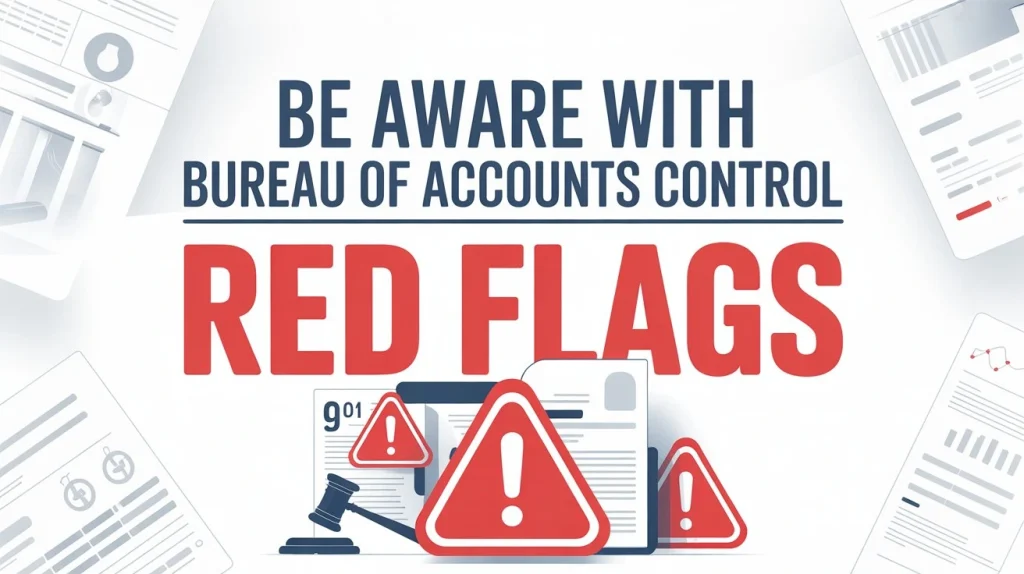Is Bureau of Accounts Control (BAC) Calling You?
If Bureau of Accounts Control (BAC) is calling you repeatedly, you may be dealing with aggressive debt collection tactics.
Some consumers report frequent calls, legal threats, or contact with third parties. You may seek help if you are fed up with them calling several times a day, threatening lawsuits, wage garnishment or contacting family or coworkers. You must know that you have rights Fair Debt Collection Practices Act (FDCPA) and other protections like the Electronic Fund Transfer Act (EFTA), which guards against unauthorized electronic payments.
Is the Bureau of Accounts Control a Scam?
According to the Better Business Bureau website, the Bureau of Accounts Control has been in business for 33 years. BAC Services LLC, a collection agency, provides insights into its history, address, and services offered.
🔗 Bureau of Accounts Control Better Business Bureau
Who is the Bureau of Accounts Control?
Bureau of Accounts Control is a third-party debt collection agency based in Howell, New Jersey. The company collects consumer debts on behalf of creditors, including medical-related accounts.
| Detail | Information |
|---|---|
| Company Name | Bureau of Accounts Control, Inc. |
| Location | Howell, New Jersey |
| Address | 3601 Route 9 North, Howell, NJ 07731 |
| Phone Number | (732) 370-7047 |
Bureau of Accounts Control is often referred to or searched for by other names. These include:
- Bureau of Accounts
- Bureau of Accounts Control
- Accounts Control
- Account Control Bureau Inc
Bureau of Accounts Control Red Flags

If the Bureau of Accounts Control engages in any of the following tactics, you may have a case:
- ➤ Using profanity or abusive language
- ➤ Calling you before 8:00 a.m. or after 9:00 p.m.
- ➤ Calling you multiple times per week
- ➤ Talking to others about your debt
- ➤ Calling your workplace
- ➤ Threatening to sue you, harm you, or destroy your credit
- ➤ Telling you or anyone else that you’ve committed a crime
- ➤ Calling repeatedly for the wrong person
- ➤ Failing to notify you of your right to dispute the debt
- ➤ Trying to collect more than legally allowed
If you have told the collector that you cannot receive calls at work or that you are unable to pay the debt, and they continue to call, this is a violation.
Unwanted calls from collection agencies can be particularly disruptive when they occur at work.
Bureau of Accounts Control Phone Numbers
Are you receiving any harassing phone calls from any of the following numbers?
- 📲 732-370-7047
- 📲 (732) 370-7047
- 📲 7323707047
If the answer is yes, then you are receiving calls from a known BAC number. When you see these numbers on your caller ID, it indicates a direct line from the Bureau of Accounts Control. You may be a victim of BAC phone harassment. The list above is not all the numbers that BAC uses. The calls can be from a different number, and it still may be the Bureau of Accounts Control calling you. Contact our office right away so we can start the process to stop BAC from calling you illegally. Above all, no one should live with harassment!
Bureau of Accounts Control Complaints
The following is a sample list of complaints filed against the Bureau of Accounts Control in the past year and can be found on Pacer.org.
- ✅2:09-cv-14602-SJM-MAR Greer v. Bureau of Accounts Control, Inc.
- ✅3:14-cv-06416-FLW-DEA Kassin v. Bureau of Accounts Control
- ✅2:08-cv-01156-FSH-PS Horton v. Bureau of Accounts Control
- ✅3:12-cv-03603-MAS-TJB Weinstein v. Bureau of Accounts Control
- ✅3:15-cv-06083-PGS-TJB Ciprano v. Bureau of Accounts Control

When evaluating reviews, look for detailed accounts of clients’ experiences, including how the agency handled their debt and the level of customer service provided. Authentic testimonials often mention specific interactions and outcomes, providing a clearer picture of the agency’s practices. On the other hand, overly generic or excessively positive reviews may be a red flag, indicating that they could be fabricated.
By taking the time to read and verify reviews, consumers can make more informed decisions about which collection agencies to trust. This due diligence can help ensure that they are working with a reputable company that respects their rights and operates within the bounds of the law.
How to Protect Yourself from Bureau of Accounts Control Harassment
Know your rights and the law
Debt collectors, including BAC, must follow the Fair Debt Collection Practices Act (FDCPA) and other protections like the Electronic Fund Transfer Act (EFTA), which guards against unauthorized electronic payments. [Source: FTC.gov]
Keep records
Document every interaction: date, time, phone number, voicemail, and what was said. These records are essential if you need to take legal action.
Request communication to stop
You can send a written cease-and-desist letter asking BAC to stop calling. Once received, they must comply.
File a complaint if rights are violated
If harassment continues, file a complaint with the Federal Trade Commission (FTC) or ’s office. These agencies can investigate and take action. [Source: NJ Consumer Affairs]
Be proactive
Understanding your rights and acting early helps you stay in control and ensures BAC treats you fairly.

About Us
Consumer Rights Law Firm, PLLC is a law firm that specializes in helping clients who are facing harassment from debt collectors in any form, including telephone communication. For inquiries, updates, or corrections regarding our services, please contact us via email. Rather than suffer alone, contact our office to begin the process to stop the Bureau of Accounts Control harassment. To get started, fill out our free consultation form. Our office has been assisting consumers since 2010. We have an A+ rating with the Better Business Bureau. You can find valuable information and forms related to collection services on our dedicated page.
🔗 Consumer Rights Law Firm Better Business Bureau
If you want to learn how to protect yourself from harassment by Transworld, Inc., we’re here to help. Call us now at 📲(877)700-5790 for immediate assistance. You can also visit our website at Consumer Rights Law Firm, PLLC.
Success Stories
“I had a medical collections company calling my number, looking for someone I had never heard of. They kept calling, even tho I told them they had the wrong number. Consumer Rights Law Firm took my case & got them to stop calling, plus they got a monetary settlement for me. I am so appreciative of the help they gave me – Teresa T”
“Mike was nice, informative, and jumped on the case A.S.A.P. Thank you, consumer rights law firm, for speaking up for me when I thought I did not have a voice. The scariest thing to hear from someone is for them to threaten to garnish your wages, and you are barely making ends meet. Once again, thanks for all your help. – Raven Hooker”
“I highly recommend this firm! They stayed on top of the case and myself. I’m sure they had a lot of cases but always treated me as a priority and I truly appreciate that!!! – Sylvester Boyd”
If You Have Any Questions, Feel Free to Visit:
Contact the now:
FAQs
1. Is BAC a scam?
No, the Bureau of Accounts Control has been in business for 33 years.
2. Can the Bureau of Accounts Control garnish my wages?
Yes, BAC can garnish your wages on a Federal Student loan or if they obtain a judgment from the courts.
3. Can BAC sue me?
Yes, BAC can sue you so long as the debt is within the statute of limitations.
4. Can BAC report my debt to the collections bureaus?
Yes, debt collectors are allowed to place the collection accounts on your credit report.
5. Can BAC arrest me?
Debt collectors don’t have the authority to have you arrested for a debt. However, if you violate a court order, a judge can issue a warrant for your arrest (e.g., unpaid child support or traffic tickets).
6. What are BAC services?
BAC offers debt collection services for businesses and creditors, including recovery of medical, retail, and commercial accounts.
7. What should I do if BAC harasses me?
Document every interaction, send a formal cease-and-desist letter, and contact a consumer rights attorney immediately.
8. What laws protect me from debt collector harassment?
The Fair Debt Collection Practices Act (FDCPA) protects consumers from harassment, threats, and misleading or unfair debt collection tactics.
9. What are signs of illegal debt collection tactics?
Warning signs include repeated or excessive calls, threats, use of profanity, contacting you at work, or discussing your debt with others.
10. How can I protect myself from BAC harassment?
Understand your rights under the FDCPA, keep detailed records of all communications, dispute inaccurate debts in writing, and seek legal assistance when necessary.







